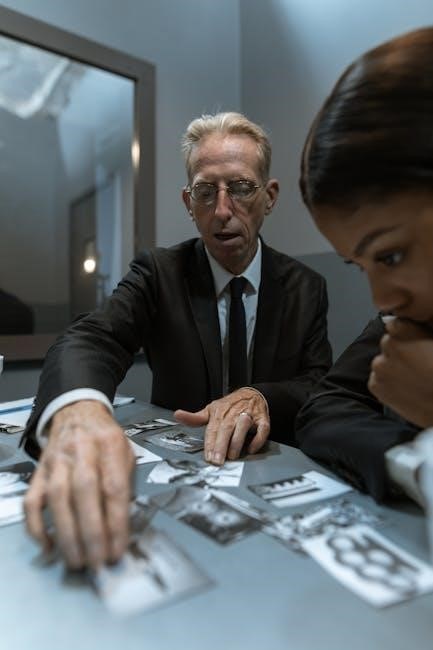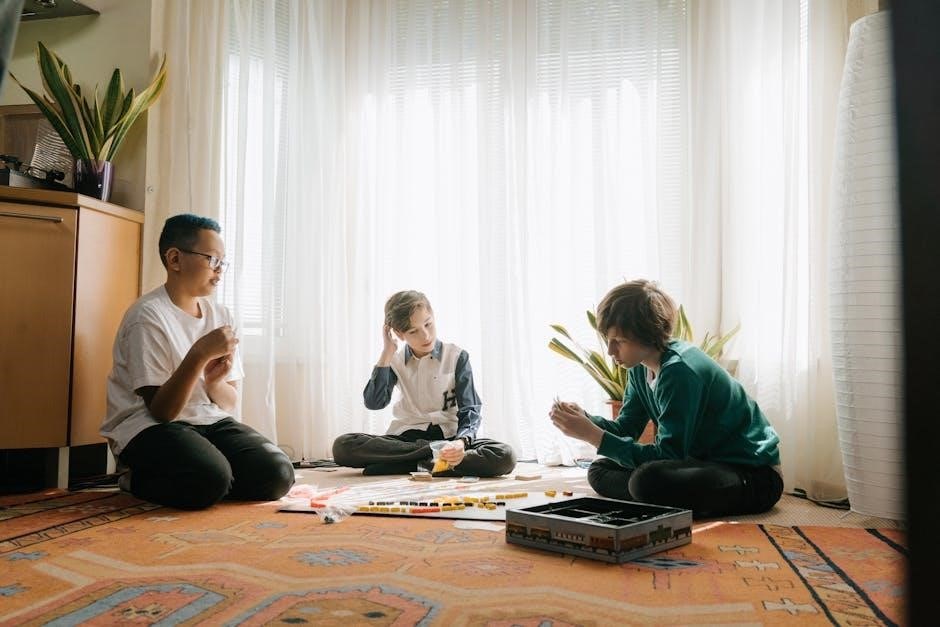Social scenario problem-solving task cards are interactive tools designed to help students navigate real-life social situations through guided discussions and problem-solving activities.
These cards present diverse, relatable scenarios, encouraging critical thinking, empathy, and effective communication.
They offer a versatile and engaging way to enhance social-emotional learning, applicable in both individual and group settings.
What Are Social Scenario Problem Solving Task Cards?
Social scenario problem-solving task cards are interactive resources designed to guide students through real-life social situations, fostering critical thinking and effective communication. These cards present diverse, relatable scenarios, such as peer interactions, classroom dynamics, or community-based challenges, and prompt students to brainstorm solutions or responses. They are often organized into sets, covering various categories, and can be used in individual, small group, or classroom settings. The goal is to enhance social awareness, empathy, and problem-solving skills, preparing students to navigate everyday social challenges confidently and effectively.
Benefits of Using Social Scenario Task Cards
Social scenario task cards enhance critical thinking, empathy, and communication skills, preparing students for real-life challenges. They foster collaboration, active participation, and problem-solving abilities in diverse situations. By focusing on realistic scenarios, these cards help students build confidence in navigating social interactions. They also provide opportunities for immediate feedback, reinforcing positive behaviors and promoting emotional intelligence. This practical approach ensures lasting skill development, making task cards a valuable tool for social-emotional learning and personal growth.
How to Integrate Task Cards into Social-Emotional Learning
Integrate task cards into SEL by incorporating them into group discussions, role-playing, and reflective activities. Use cards to align with SEL goals like self-awareness and relationship skills. For example, present scenarios that encourage students to think critically about social interactions. Adapt task cards for different age groups and learning needs. Utilize both group and individual activities to promote engagement and understanding. This approach helps students develop essential life skills in a structured and interactive manner.

Components of Effective Social Scenario Task Cards
Effective task cards include realistic scenarios, clear instructions, and visual or textual prompts. They encourage discussion, reflection, and problem-solving, aligning with social-emotional learning goals.
Key Features of Problem Solving Task Cards
Social scenario problem-solving task cards feature realistic, relatable situations that prompt critical thinking and collaboration. They include clear instructions, visual or textual prompts, and open-ended questions to encourage discussion and reflection. These cards are designed to cater to diverse learning needs, offering structured scenarios that align with social-emotional learning goals. They often incorporate role-playing, group work, or individual reflection, making them adaptable for various classroom settings. Their portability and ease of use enhance flexibility, ensuring engaging and effective skill development for students of all ages.
Designing Engaging and Realistic Scenarios
Effective task cards feature scenarios rooted in real-life situations, making them relatable and impactful for students. These scenarios often involve peer interactions, family dynamics, or classroom challenges, ensuring relevance and engagement. Designers craft scenarios that prompt critical thinking and collaboration, encouraging students to explore multiple perspectives. The use of diverse social contexts ensures the scenarios resonate with a wide range of learners, fostering empathy and understanding. By mirroring real-world dilemmas, these scenarios prepare students to navigate everyday social challenges with confidence and adaptability.
Incorporating Visual and Textual Elements
Social scenario task cards often combine visual and textual elements to enhance engagement and understanding. Visuals such as images or diagrams help students connect with scenarios, making them more relatable and accessible. Textual descriptions provide context and depth, guiding students to analyze situations critically. This combination supports diverse learning styles, ensuring all students can engage meaningfully. Visuals also aid in decoding social cues, while text offers clarity, fostering a comprehensive learning experience that caters to individual needs and preferences.

Target Audience for Social Scenario Task Cards
Social scenario task cards primarily target elementary-age learners, but they can be adapted for older students. They are universally applicable across diverse student groups and needs.
Elementary-Age Learners and Their Needs
Social scenario task cards are ideal for elementary-age learners, addressing their need to develop fundamental social and problem-solving skills. These cards present relatable scenarios, such as playground interactions or classroom challenges, helping students navigate everyday situations. By engaging with these tasks, young learners build critical thinking and empathy, essential for forming positive relationships and managing conflicts effectively.
Adapting Task Cards for Older Students
Task cards for older students are tailored to address more complex social scenarios, such as bullying, academic pressures, and social media interactions. These cards encourage deeper critical thinking and application of problem-solving skills to real-world challenges. Designed to align with the maturity of middle and high school learners, they focus on advanced communication, conflict resolution, and empathy development. This adaptation ensures older students are well-prepared to navigate broader social dynamics and lifelong interpersonal challenges effectively.
Universal Application Across Diverse Student Groups
Social scenario task cards are versatile tools that cater to diverse student groups, including those with varying learning needs and cultural backgrounds. Their universal design ensures accessibility, allowing teachers to adapt scenarios to suit different abilities. By incorporating diverse perspectives and real-life situations, these cards promote inclusivity and empathy. This universal application fosters a collaborative learning environment where all students can engage and benefit, regardless of their individual differences or backgrounds.

Teaching Strategies with Task Cards
Task cards engage students in real-life scenarios, fostering collaboration, active participation, and critical thinking. They can be used for group discussions or individual practice, suiting various instructional settings.
Setting Up Group Discussions
Organize task cards by selecting relevant scenarios and distributing them evenly among participants. Create a structured environment where students can discuss each scenario thoughtfully. Encourage active listening and respectful communication to foster collaboration. For younger students, consider pairing them with peers or adults to guide their problem-solving. Ensure clear instructions are provided, and model the expected behavior to help students navigate the activity confidently. This setup promotes engagement and ensures all participants can contribute effectively to the discussion.
Encouraging Collaboration and Active Participation
Introduce task card scenarios to groups, ensuring all students understand the context. Use structured methods like Think-Pair-Share to promote participation and reduce dominance by outspoken students. Assign roles such as facilitator or recorder to keep discussions organized. Encourage students to build on each other’s ideas and explore multiple perspectives. Provide open-ended questions to guide the conversation and help students think critically. This collaborative approach strengthens social skills and prepares students for real-world teamwork scenarios.
Using Task Cards for Individual Practice
Task cards can be used for individual practice, allowing students to develop social problem-solving skills at their own pace. Distribute cards with specific scenarios, such as peer interactions or classroom situations. Encourage students to reflect independently, identifying potential solutions and consequences. Provide structured worksheets or reflection forms to guide their thinking, ensuring they consider multiple perspectives and outcomes. Allow time for students to write down their thoughts and solutions, then review their responses to offer feedback. This method reinforces individual understanding and provides a quiet space for introverted or shy students to engage deeply with the material without feeling overwhelmed.
Skill Development Through Task Cards
Social scenario task cards foster problem-solving, critical thinking, empathy, and communication skills, empowering students to navigate social challenges with confidence and emotional intelligence.
Enhancing Problem Solving and Critical Thinking
Social scenario task cards present realistic dilemmas, prompting students to analyze situations, brainstorm solutions, and evaluate consequences. This structured approach enhances problem-solving skills, encouraging logical reasoning and informed decision-making. By considering multiple perspectives, students develop critical thinking abilities, learning to approach challenges methodically. Regular practice with diverse scenarios builds confidence in addressing real-life issues, fostering a mindset prepared for academic and social challenges. These activities lay a strong foundation for navigating complex situations effectively.
Building Empathy and Social Awareness
Social scenario task cards foster empathy by encouraging students to consider others’ perspectives and emotions in real-life situations. Through role-playing and discussions, students learn to recognize how their actions impact others and develop respectful communication skills. These activities promote social awareness by helping students interpret cues like body language and tone, enhancing their ability to navigate interactions sensitively. Regular practice strengthens their capacity to connect with peers, fostering a more inclusive and harmonious social environment.
Improving Communication and Conflict Resolution
Social scenario task cards enhance communication skills by encouraging students to express thoughts and feelings effectively. Through role-playing and group discussions, students learn to articulate perspectives clearly and listen actively. These activities foster conflict resolution by presenting situations requiring negotiation and compromise. Students practice identifying issues, expressing emotions respectfully, and proposing solutions. Task cards guide students to develop peaceful resolutions, building confidence in addressing conflicts constructively and improving interpersonal relationships.

Real-World Applications of Task Cards

Social scenario task cards prepare students for real-life challenges by exposing them to diverse, relatable situations like peer conflicts and classroom dynamics.
They also address community-based scenarios, fostering practical problem-solving skills for everyday interactions and broader social understanding.
Preparing Students for Everyday Social Challenges
Social scenario task cards expose students to realistic situations, such as peer conflicts, classroom dynamics, and community interactions, helping them develop practical problem-solving strategies.
By engaging with these scenarios, students enhance their ability to navigate everyday challenges confidently, fostering critical thinking and empathy.
These tools encourage students to brainstorm solutions, consider consequences, and practice respectful communication, equipping them to handle real-life social interactions effectively.
Addressing Peer Interactions and Classroom Dynamics
Social scenario task cards address common challenges like peer conflicts, sharing, and classroom etiquette, helping students develop strategies for positive interactions.
These tools guide students in understanding social cues, resolving disagreements, and fostering respectful communication, creating a supportive learning environment.
By practicing these scenarios, students build confidence in navigating real-life peer interactions and classroom dynamics, promoting collaboration and emotional intelligence.
Community-Based Scenarios for Broader Understanding
Community-based scenarios expand students’ understanding beyond the classroom, addressing real-world challenges like neighborhood conflicts and public interactions.
These task cards encourage students to consider diverse perspectives and develop solutions that promote harmony within communities.
By engaging with these scenarios, students gain empathy and practical skills to navigate complex social situations outside of school, fostering a broader sense of responsibility and cooperation.

Differentiated Instruction with Task Cards
Task cards cater to diverse learning needs, offering adaptable scenarios for varied abilities and learning styles, ensuring all students engage effectively in social-emotional learning activities.
Catering to Diverse Learning Needs
Task cards are adaptable to meet the needs of all learners, including those with special needs or language barriers. They can be modified to suit different learning styles, ensuring every student engages effectively. For visual learners, cards with images or diagrams enhance understanding, while text-heavy versions cater to strong readers. Teachers can adjust scenarios to align with students’ experiences, making learning relatable and inclusive. This flexibility ensures task cards are accessible and beneficial for every student, fostering growth in social-emotional skills across diverse learning needs.
Examples of Task Card Adaptations
Task cards can be adapted to meet specific learning needs, such as age-appropriate scenarios for elementary or secondary students. Visual aids like images or diagrams can support visual learners, while simplified language helps English language learners. For advanced students, complex scenarios with multiple perspectives can be introduced. Examples include “How Big Is My Problem?” cards for scaling issues and kindness-focused activities to promote empathy. These adaptations ensure task cards are engaging and effective for diverse learners, fostering tailored skill development.
Monitoring Progress and Providing Feedback
Monitoring student progress with task cards involves observing participation, reviewing responses, and assessing problem-solving strategies. Educators can use structured worksheets or reflection forms to track improvements in critical thinking and empathy. Providing constructive feedback helps students refine their skills, while positive reinforcement encourages confidence. Regular check-ins allow teachers to adjust instruction, ensuring students receive tailored support. This iterative process fosters continuous growth, helping students develop effective social problem-solving abilities and apply them confidently in real-life situations.

Digital and Print Formats of Task Cards
Social scenario task cards are available in both digital and print formats, offering flexibility for various learning environments. Digital versions provide interactive features, while print options are ideal for hands-on activities.
Both formats ensure accessibility and engagement, catering to diverse learning preferences and settings, and enhancing social-emotional learning experiences effectively.
Flexibility in Usage Across Different Settings
Social scenario task cards are versatile and adaptable for various educational environments, including classrooms, small groups, and individual practice. Their portability and ease of use make them ideal for different settings, ensuring accessibility for all learners. Whether used in a traditional classroom, a homeschooling environment, or a community center, these task cards provide consistent learning opportunities. Both digital and print formats cater to diverse preferences, allowing educators to implement them flexibly. This adaptability ensures that students can engage with the material in ways that suit their learning needs, promoting effective social-emotional development regardless of the setting.
Advantages of Digital Task Cards
Digital task cards offer enhanced accessibility and convenience, allowing students to engage with materials anytime, anywhere. They provide interactive features that make learning more engaging and fun. Digital formats reduce preparation time for educators, as they can be easily shared and accessed across devices. Additionally, they support environmentally friendly practices by eliminating the need for physical printing. Digital task cards also enable immediate feedback, fostering a dynamic and responsive learning environment that caters to diverse student needs and preferences.
Print-Friendly Options for Classroom Use
Print-friendly task cards provide a practical solution for classroom activities, ensuring accessibility for all students. They are easy to distribute and can be used in group discussions or individual practice. Printing options allow teachers to customize the cards according to classroom needs, making them versatile for various learning environments. This format supports hands-on engagement, helping students focus on problem-solving and collaboration without digital distractions. Printed task cards are ideal for creating interactive and inclusive learning experiences in traditional classroom settings.

Cultural and Individual Considerations
Cultural and individual considerations ensure task cards reflect diverse perspectives and meet unique student needs, fostering an inclusive learning environment.
Incorporating Diverse Perspectives
Social scenario task cards incorporate diverse perspectives by including scenarios from various cultural backgrounds, family structures, and individual experiences.
This ensures students can relate to and understand different viewpoints, fostering empathy and inclusivity.
By addressing a wide range of social dynamics, these cards promote cultural sensitivity and prepare students to interact thoughtfully in a diverse world.
Addressing Individual Student Needs
Social scenario task cards can be adapted to meet the unique needs of individual students, ensuring personalized learning experiences.
Teachers can modify scenarios to align with students’ developmental levels, learning styles, or specific challenges, such as understanding social cues or managing emotions.
For example, younger students may benefit from simpler scenarios, while older students can engage with more complex, real-world dilemmas.
This adaptability ensures that all learners can develop problem-solving skills tailored to their individual growth and understanding.
By addressing diverse needs, task cards promote inclusivity and equity in social-emotional learning.
Cultural Sensitivity in Scenario Design
Cultural sensitivity is crucial in designing social scenario task cards to ensure inclusivity and representation of diverse backgrounds.
Scenarios should reflect varied cultural traditions, languages, and family values, making students from all backgrounds feel seen and respected.
By incorporating diverse perspectives, task cards foster empathy and understanding, helping students navigate interactions across cultures.
This approach promotes social harmony and prepares learners to engage respectfully in a globalized world.

Assessment and Feedback
Task cards allow teachers to monitor student progress and provide constructive feedback, reinforcing positive behaviors and fostering continuous improvement in social problem-solving skills.
Evaluating Student Progress
Evaluating student progress involves observing participation in group discussions, reviewing written responses, and assessing problem-solving approaches during task card activities.
Teachers can monitor improvements in critical thinking, empathy, and communication skills over time, using task cards as a tool to track developmental milestones effectively.
Regular review of student work and feedback provides insights into their understanding of social scenarios, enabling tailored instruction to address specific needs and celebrate growth.
Providing Constructive Feedback
Constructive feedback is essential for helping students refine their problem-solving and social skills. Teachers should focus on specific aspects of their solutions, praising strengths and gently highlighting areas for improvement. Timely feedback encourages reflection and growth, guiding students to think critically about their responses and actions in social scenarios.
By linking feedback to real-life applications, educators help students connect their learning to practical situations, fostering confidence and a deeper understanding of social dynamics.
Reinforcing Positive Behaviors
Social scenario task cards provide opportunities to reinforce positive behaviors by acknowledging and encouraging constructive responses. Teachers can highlight students’ thoughtful solutions and respectful communication, fostering a growth mindset.
By celebrating students’ ability to navigate scenarios effectively, educators promote confidence and a positive attitude toward social interactions. This reinforcement helps students internalize healthy behaviors and apply them in real-life situations.
Social scenario problem-solving task cards are invaluable tools for fostering social-emotional learning, providing students with practical strategies to navigate real-life challenges confidently and effectively.
Social scenario task cards are essential tools for social-emotional learning, equipping students with critical thinking, empathy, and communication skills.
They provide realistic situations for students to practice problem-solving, fostering confidence in navigating real-life challenges.
These cards promote collaboration, adaptability, and self-awareness, preparing students for diverse social interactions and lifelong success.
Final Thoughts on Effective Implementation
Effective implementation of social scenario task cards requires clear guidance and structured activities to maximize student engagement and learning outcomes.
Teachers should encourage active participation, provide constructive feedback, and create a supportive environment for open discussions.
By integrating these tools into daily lessons, educators can foster resilience, empathy, and critical thinking, empowering students to navigate social challenges confidently.
